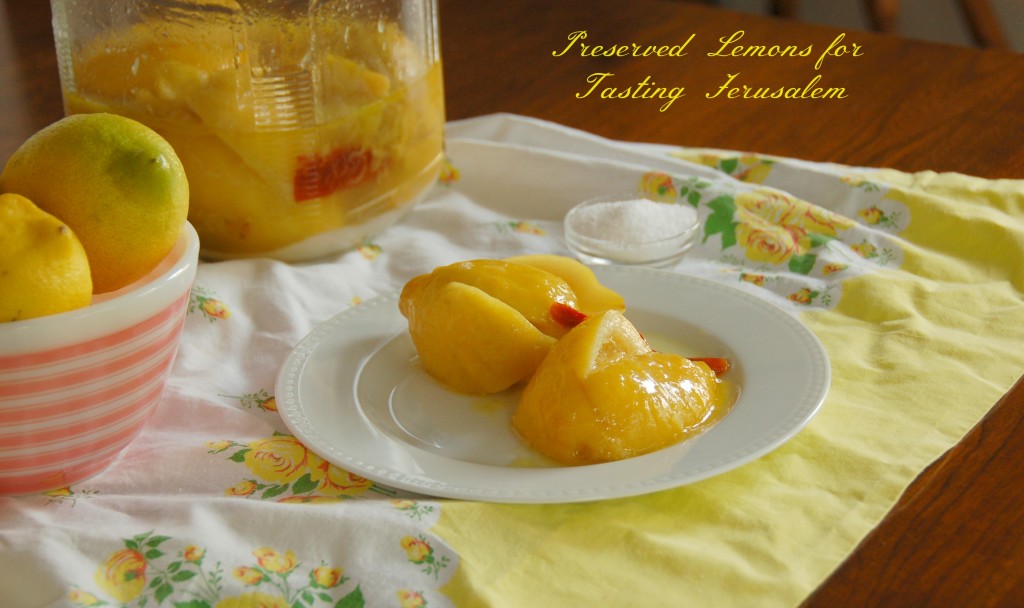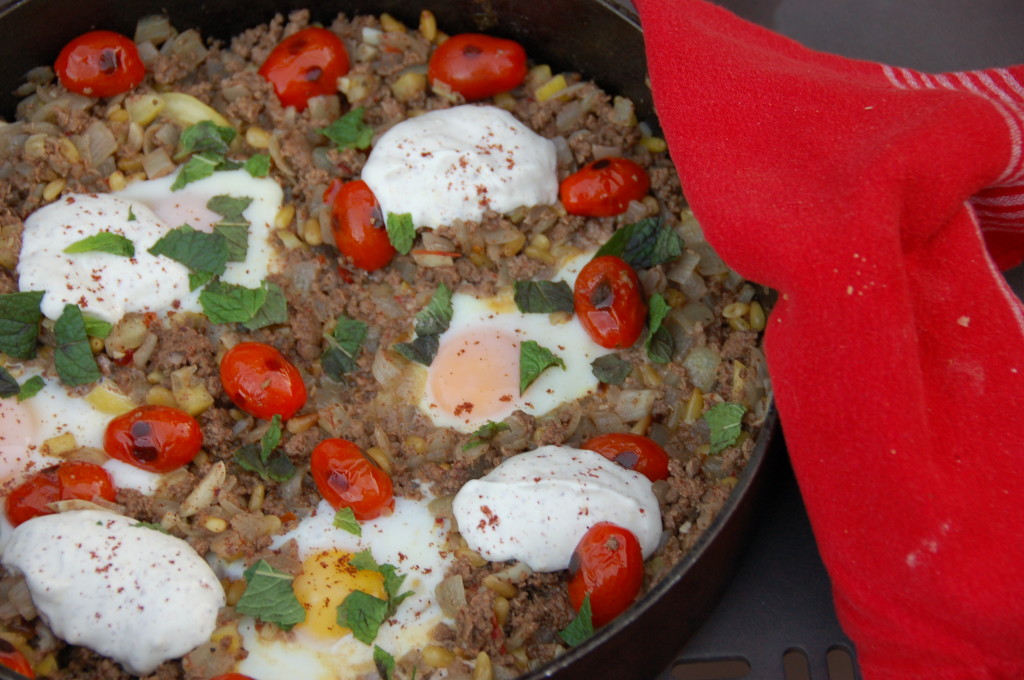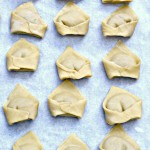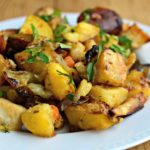It’s June and that means it is time for a new Tasting Jerusalem challenge! Created by two food writers, Beth from the blog OMG! Yummy and Sarene Wallace from 805 Living magazine, Tasting Jerusalem is a community dedicated to exploring the cuisine of the Middle East using the cookbook Jerusalem by Yotam Ottolenghi and Sami Tamimi as a guide. Each month, the organizers select a different ingredient featured in Jerusalem and ask the members to cook one or more of the recipes from the book that feature the chosen ingredient. The participants then share their experiences on their blogs, on and on Twitter using the hash tag #TastingJrslm.
This month’s featured ingredient is preserved lemons. Preserved (or pickled) lemons are a staple of Middle Eastern and North African cooking. People began preserving lemons ages ago as a way to continue to enjoy these citrus fruits after their season had ended. Now, of course, we can buy lemons all year long, but it is still worth making preserved lemons because their flavor is quite different from raw lemons. The preserving process softens the lemon peel and tames the bitterness so that you can use the whole peel, not just the thin outer layer of zest, in your cooking. A little bit of preserved lemons goes a long way — the flavor is quite intense — but it is actually an incredibly useful ingredient. Since making my first batch of preserved lemons, I have been adding a tablespoon of the diced fruit to all kinds of dishes from sautés to salads to risotto — whenever I sense that the dish could use a hit of acid plus salt.
Because it takes at least four weeks to make preserved lemons, I actually started working on this challenge back in May. While they may require some advance planning, preserved lemons are very simple to make and take almost no work. And you don’t need to know any special home food preservation techniques. It is one of those projects that is worth doing a few times a year to ensure a ready supply of preserved lemons whenever you feel the urge to create some authentic North African fare — or just want to jazz up a basic salad or couscous.
There are many preserved lemon recipes out there and they all have a similar technique. Essentially, you need 6 or 8 lemons, kosher salt and a sterilized jar big enough to hold all the lemons. After scrubbing the lemons, you cut a deep cross in them lengthwise taking care not to cut all the way through. Stuff each lemon with a tablespoon of kosher salt and pack them in the jar. Store the jar in a cool, dark spot for 5 to 7 days. After this initial period, the lemons will soften and release some of their juices. Squeeze as much of the remaining juice out of the lemons as you can, then return them to the jar. Cover them with more lemon juice and add any flavorings you desire. (In Jerusalem, Ottolenghi and Tamimi recommend rosemary and chile. I skipped the rosemary because I don’t care for it, but I did add a dried red chile to my jar for some heat.) Add a thin layer of olive oil to cover and store the jar in a cool, dark spot or the refrigerator for at least four weeks. After four weeks, your lemons are ready to use. Chop them up and add them to all kinds of dishes. You may want to rinse your lemons before cooking with them as they are quite salty.
Olives are a classic pairing with preserved lemons as are dishes with dried fruit — the lemon counterbalances the sweetness of the fruit. But as I said, it is a versatile ingredient. In the past few weeks, I have added a spoonful of chopped preserved lemon to a lentil salad, a risotto made with squash blossoms and a couscous with zucchini and raisins. In each case, just a small bit of preserved lemon added an intense note of acidity and brininess. Plus, the preserved lemon adds a lovely chewiness and satiny texture to your dishes.
There are three recipes in Jerusalem that call for preserved lemons:
- Charred Okra with Tomato, Garlic & Preserved Lemon (page 74)
- Fish & Caper Kebabs with Burnt Eggplant & Lemon Pickle (page 221).
- Braised Eggs with Lamb, Tahini and Sumac (pg. 205)
Of those three, only the last one was a realistic choice for me. My beloved husband doesn’t eat fish and it is still too early for okra here in Northern Illinois. (I may try that charred okra recipe in a few weeks when I can find okra at the farmers market.) So I made the braised eggs recipe modifying it a bit for our family’s tastes. This recipe essentially has you cook onions, garlic and ground lamb together, seasoned with cumin and sumac. To that mixture, you add harissa, pine nuts, pistachios and preserved lemon. To finish the dish, you add some liquid to the pan and poach four eggs in the meat mixture. To serve, you add charred cherry tomatoes, dollops of a yogurt and tahini sauce, and fresh herbs. The final result is a colorful and flavorful one-dish meal.
When I made the Braised Eggs with Lamb and Sumac, I eliminated the pistachios and made a yogurt and sumac sauce — as opposed to the yogurt and tahini sauce — because of my daughter’s nut and sesame allergies. I don’t think the dish suffered any from my modifications. It is still quite spectacular-looking and very flavorful with tart notes from the preserved lemons and sumac, spice from the harissa and sweetness from the tomatoes. The cumin and ground lamb add earthiness. You also get a lot of contrasting textures in every bite, from the pop of the tomatoes to the firm bite of the pine nuts to the velvety eggs and preserved lemons. This braised lamb is one of Jerusalem‘s signature dishes and one can easily see why.
Are you familiar with preserved lemons? Have you ever tried making them at home or used them in your cooking?
Tasting Jerusalem is a virtual cooking community exploring the vibrant flavors and cuisine of the Middle East through the lens of “Jerusalem: A Cookbook” by Ottolenghi and Tamimi published by Ten Speed Press. You can follow along and cook with us by subscribing to omgyummy.com, following the hashtag #TastingJrslm on Twitter and Instagram, and liking our Facebook page.








Wonderful post, Emily! I like your addition of the chile pepper to give the lemon’s a extra spark.
Thanks Sarene! I think the preserved lemons benefit from a bit of heat.
Sorry it took me so long to get over to say hi – I’ve been out and about for most of June. This is a wonderful post Emily – so full of information, description, and great ideas for how to make and use preserved lemons. I get excited about them all over again just reading this. I made Hannah’s super simple chicken salad the other day with them – so easy but wow – what a great twist. And they married beautifully with basil. I’m getting hungry writing this! Hope you are having a great 4th! Thanks for being such a great member of our group.
Thank you, Beth. I really enjoy being in the group so much. I love this book and it is great to share my experiences cooking with it.
Oh, bravo! Your lemons look amazing. I’ve always wanted to preserve them and now you’ve convinced me to do it. I was just invited to join the Tasting Jerusalem group and your name caught my eye because I grew up in Wheaton.
Hi Christiane! Yes, Wheaton is not far from here. Where do you live now? I hope to see you more through Tasting Jerusalem.